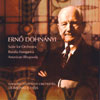Dohnányi American Rhapsody; Ruralia hungarica; Suite for Orchestra
Dohnányi, the link between Brahms and Bartók, played with conviction
View record and artist detailsRecord and Artist Details
Composer or Director: Ernö Dohnányi
Genre:
Orchestral
Label: Warner Classics
Magazine Review Date: 4/2006
Media Format: CD or Download
Media Runtime: 71
Mastering:
Stereo
DDD
Catalogue Number: 2564 62409-2

Tracks:
| Composition | Artist Credit |
|---|---|
| Suite |
Ernö Dohnányi, Composer
Danubia Symphony Orchestra Domonkos Héja, Conductor Ernö Dohnányi, Composer |
| Ruralia hungarica |
Ernö Dohnányi, Composer
Danubia Symphony Orchestra Domonkos Héja, Conductor Ernö Dohnányi, Composer |
| American Rhapsody |
Ernö Dohnányi, Composer
Danubia Symphony Orchestra Domonkos Héja, Conductor Ernö Dohnányi, Composer |
Author: Rob Cowan
Good to have Dohnányi delivered in bright, local packaging, though the more luxuriant BBC Philharmonic under Matthias Bamert offer viable and beautifully recorded alternatives for both works. The substantial Suite, Op 19, revisits Brahmsian vistas, the string-writing especially, and at around the seven-minute mark into the sizeable theme-and-variations first movement there’s a vivid premonition of Bartók and Bluebeard’s cache of jewels (put together some 10 years later). Clean, incisive, light in texture – Héja’s still-young orchestra is all of these and projects a subtly individual personality, at once grainy and slimline, if not yet quite the equal of Iván Fischer’s more colourful Budapest Festival band. The Danubia’s playing of the Suite’s Scherzo (echoes of the Russian late-Romantics) and momentarily Mahlerian finale is quite brilliant, whereas the strings do very nicely in the exotic Romanza slow movement.
The somewhat later suite Ruralia hungarica is less ‘earth under the fingernails’ (which is what Bartók and Kodály were offering) than peasant life spied from the business lounge. By a process of gradual elimination this attractive seven-movement piano suite became a five-movement orchestral suite then a three-movement a suite for violin and piano which was famously – and magnificently – recorded by Kreisler just after the arrangement was prepared. The suite’s lyrical centrepiece is the dusky, rhapsodic Adagio non troppo, widely known out of context as a ‘Gypsy Andante’. If you don’t immediately recognise it, be patient: the big theme sweeps in at around the two-minute mark. The more memorable of the fast movements, pungently played here, is the pentatonic Presto with its coincidental echoes of American-Indian music, while the finale is charmingly childlike in its simplicity.
How different the relatively late and infinitely more complex American Rhapsody, a melange of traditional tunes woven into a contrapuntal tapestry that would have made even Reger green with envy. Good to hear once or twice, especially when played with conviction and just a touch of wistfulness – which is how it’s played here. Good sound.
The somewhat later suite Ruralia hungarica is less ‘earth under the fingernails’ (which is what Bartók and Kodály were offering) than peasant life spied from the business lounge. By a process of gradual elimination this attractive seven-movement piano suite became a five-movement orchestral suite then a three-movement a suite for violin and piano which was famously – and magnificently – recorded by Kreisler just after the arrangement was prepared. The suite’s lyrical centrepiece is the dusky, rhapsodic Adagio non troppo, widely known out of context as a ‘Gypsy Andante’. If you don’t immediately recognise it, be patient: the big theme sweeps in at around the two-minute mark. The more memorable of the fast movements, pungently played here, is the pentatonic Presto with its coincidental echoes of American-Indian music, while the finale is charmingly childlike in its simplicity.
How different the relatively late and infinitely more complex American Rhapsody, a melange of traditional tunes woven into a contrapuntal tapestry that would have made even Reger green with envy. Good to hear once or twice, especially when played with conviction and just a touch of wistfulness – which is how it’s played here. Good sound.
Discover the world's largest classical music catalogue with Presto Music.

Gramophone Digital Club
- Digital Edition
- Digital Archive
- Reviews Database
- Full website access
From £8.75 / month
Subscribe
Gramophone Full Club
- Print Edition
- Digital Edition
- Digital Archive
- Reviews Database
- Full website access
From £11.00 / month
Subscribe
If you are a library, university or other organisation that would be interested in an institutional subscription to Gramophone please click here for further information.




